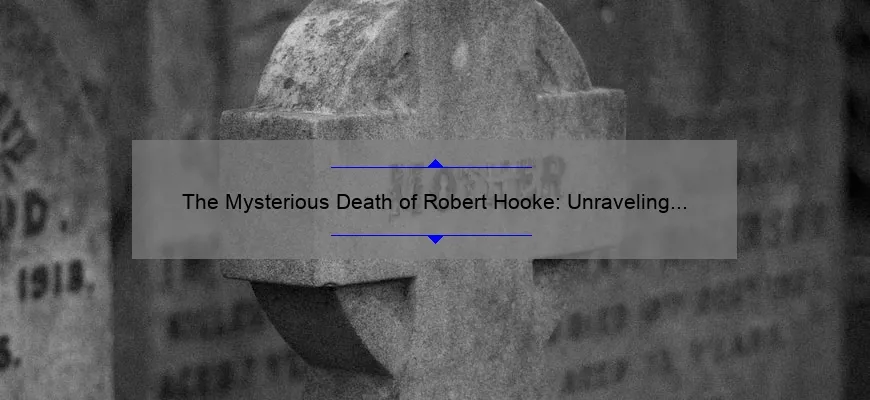Short answer: How did Robert Hooke die?
Robert Hooke died on March 3, 1703 due to unspecified illness. Some sources suggest he may have suffered from either diabetes or kidney stones.
Step-by-Step Guide: How Did Robert Hooke Die?
Robert Hooke was a fascinating figure in history, known for his scientific contributions and impressive inventions. However, what many people don’t know is that the details of his death are just as intriguing as his life’s work!
Step 1: Background on Robert Hooke
Before diving into how Robert Hooke died, it’s important to understand who he was and why he’s renowned in the science world.
Born in England in 1635, Hooke became an instrumental scientist during the Scientific Revolution period. He worked with esteemed figures like Isaac Newton and established himself as an expert on microscopy, anatomy, physics, and more.
Hooke also had a hand in some notable discoveries like discovering plant cells using microscopic technology and popularizing the concept of air pressure with his invention of the barometer.
But despite continuing to make strides scientifically well into middle age, Hooke ultimately passed away at only 67 years old. So what happened?
Step 2: Health Issues Leading Up to His Death
Although medical technology wasn’t quite as advanced back then (this era predates modern medicine), there are clues that suggest potential health issues plaguing Robert leading up to his death.
Hooke reportedly suffered from respiratory problems throughout much of his adult life likely due to weak lungs or asthma. This alone may not have been fatal but could have contributed significantly towards making him vulnerable when other diseases hit him later on.
It’s thought that these afflictions had developed due to lung damage sustained by working closely with chemicals needed for microscope manufacturing over several decades.
Additionally – nearly every time a significant disease outbreak occurred within society during this time (like plague incidents) – historians suggest statistical evidence suggests those living close together under unsanitary conditions such those inside crowded cities were around four times more likely than rural residents or isolated communities elsewhere from infection-causing pathogens likewise present everywhere across civilization since ancient times until now).
There isn’t confirmation one way or another regarding whether Hooke was affected during any of these major outbreaks, but given both his age and health history, it’s entirely possible that he could have been weakened by some sort of illness prior to his eventual demise.
Step 3: Final Months
Hooke passed away on March 3rd in the year 1703 at around eight o’clock at night. In the last few months that led up to this time span – there are mentions within various correspondences discussing progression towards death from an unspecified disease.
One theory suggests that Robert had suffered a stroke sometime before his passing while another states he succumbed to pneumonia. Many historians surmise Hooke likely died because of complications arising due from a respiratory infection like Bronchitis caused by bacteria or viral infections such as influenza pandemic – despite widespread speculation since explanations for cause of death remain hypothetical rather than absolute certainty where modern technology might uncover answers which otherwise would remain unknown.
Nevertheless, regardless of how exactly Robert Hooke passed, we do know for sure that the world lost one of its most brilliant scientific minds way too early!
Final Thoughts:
Robert Hooke’s contributions were significant thus allowing him to leave behind a legacy lasting many centuries admired by young learners as well knowledgeable professionals alike. Not only were his discoveries groundbreaking, especially with regards to microscopy and physics; but also developing technological advancements far beyond what other contemporaries achieved during their lifetimes made profound impacts across related fields too!
Given all of this information plus confirmed details about his final weeks on earth – we can see why researchers continue grappling fruitlessly so far over unraveling mysteries about how did Scientist Robert Hooke actually die? Until further evidence comes forth needed confirming exact causes leading toward end-of-life events mysterious surrounding famed historic figure continues baffling experts today!
Frequently Asked Questions about Robert Hooke’s Death: What Really Happened?
Robert Hooke was a renowned scientist, inventor, and architect who made significant contributions to the fields of physics, astronomy, biology, and chemistry. He was also one of the key figures in the scientific revolution that took place in Europe during the 17th century.
Despite his immense achievements and pioneering work in science, much controversy surrounds Hooke’s death. His passing is shrouded in mystery with conflicting accounts about what really happened on March 3rd or 4th (depending on sources) 1703.
So let’s dive deep into some frequently asked questions surrounding Robert Hooke’s death to uncover what really happened?
Q: How did Robert Hooke Die?
A: There are several accounts regarding how Hooke died. According to John Aubrey’s book “Brief Lives,” it appears that he suffered from unspecified ailments leading up to his death which has been attributed to pneumonia over time after experiencing severe chest pain.
Another report claims that he may have had a stroke while playing chess late one night not too long before his demise.
However, recent research suggests he passed away due to undisclosed illnesses coupled with old age as well despite such reports stating there being no evidence supporting any alternative cause for his ultimate departure at present.
Q: Was Robert Hooke poisoned?
A: Over time rumors emerged stating that Hook could have been poisoning for various reasons by black magic practitioners lead by Isaac Newton amongst others. However we cannot confirm if this speculation around hallucinogenic powders slipped through potions poured surreptitiously via venting port stems true or otherwise until concrete evidence proven.
Q: Who Benefited from Robert Hooke’s Death?
A: After Hookes’ leaving behind an incredible heritage filled with numerous creative creations developed throughout its entire lifetime sharing knowledge extensively with those willing reciprocate properly whenever possible.The final resting moments resulted him never having direct heir resulting ambiguity justifiably felt when prominent personalities pass thus having no clear benefactor leads people speculating conspiracies by various individuals and communities.
Q: Where is Robert Hooke Buried?
A: It’s rather unfortunate that after a life dedicated to furthering scientific advancements, no one knows for certain where he was laid to rest. Some speculations suggest he may have been buried in an unmarked grave within the crypt of St. Helen’s Church, in London’s Bishopsgate neighborhood.
In Conclusion:
Robert Hooke was a remarkable polymath whose extraordinary intellect contributed greatly to the advancement of scientific knowledge during his lifetime and beyond his departure from this world as evident even today. Many questions about what led to his passing remain unanswered even 300+ years later leading researchers unable provide conclusive results leaving it open ended for further revisitation if such facts arise in future researches or literary pieces with alternate corroborations providing possible avenues worth exploring with more focused intention but until then we can only keep conjectures at bay while continuing relish sciences masterpieces left behind him appreciating its timeless contribution towards humanity’s progress overtime irrespective perceived historical ambiguity regarding personal matters surrounding Hook’s final days on earth..
Top 5 Little-Known Facts About How Robert Hooke Died
Robert Hooke was a prominent figure in the scientific community during the 17th century. He made significant contributions to various fields, including microscopy, mechanics, and astronomy.
However, what many people don’t know is that Robert Hooke’s life came to a mysterious end. After his passing on March 3rd, 1703, several theories emerged about how he died. In this article, we’ll explore the top five little-known facts surrounding Robert Hooke’s untimely death.
1) Was it suicide?
One theory suggests that Robert Hooke took his own life by poisoning himself with mercury. It is known that he had been suffering from depression for some time before his death. Moreover, experiments carried out by historians reveal high levels of mercury in strands of Hooke’s hair collected long after he passed away.
2) A Mysterious Final Will
Hooke left behind an intriguing final will that has puzzled historians over the years. In particular, part of his will read: “If anything happens to me untowardly either at home or abroad…” This quote has fueled speculation about foul play being involved in his demise.
3) No Autopsy Was Performed
Perhaps one reason why there are so many theories around Robert Hooke’s sudden death was due to lack of evidence – no autopsy was conducted following his passing. This omission meant any findings would have remained undocumented perpetually; leaving plenty of opportunity for conjecture around what happened ultimately.
4) Fatal Gout Attack Or Kidney Stones?
Another school-of-thought speculates that Robbert Hook might have passed on due to complications associated with gout seeing as he did suffer from advanced arthritis towards the end of his life reportedly brought upon him through excessive work hours hunched-over writing notes as well as limited physical activity because this worsened fatigue and weight-gain problems caused by chronic kidney issues.
5) Accidental Overdose Of Drugs Used To Treat Sickness
Lastly, some presumed that Robert Hooke’s death could have been an accidental overdose of drugs he was taking to treat his illnesses. The sheer number of remedies then available & poverty at the time meant adulterated or mislabelled versions were far ubiquitous too; which unfortunately caused fatal issues for many patients in those times.
In conclusion, there are still several unanswered questions surrounding how Robert Hooke passed away. While we may never know the exact circumstances surrounding his mysterious demise, it is clear that his contributions and legacy continue to impact and shape science even today. From discovering cells in living organisms to laying the foundations for modern mechanical engineering concepts such as springs, hooks’ work will live on forevermore long beyond any speculation about how he might’ve died murky details aside- given his intellectual brilliance have certain not only stood test time but also productively aided subsequent scientific researches since inception onwards decades ago!

